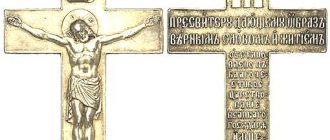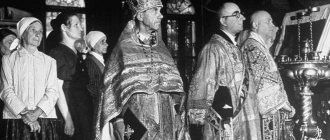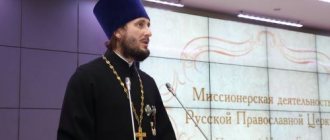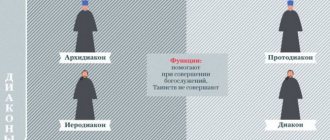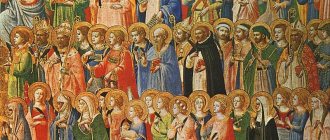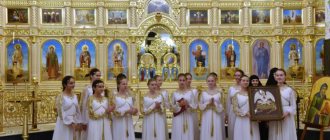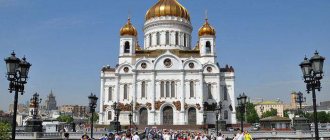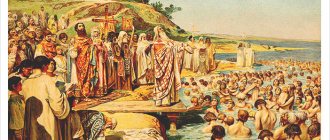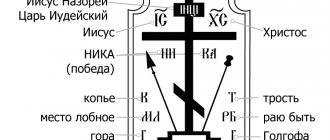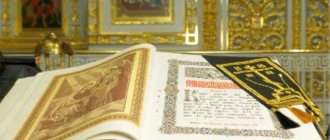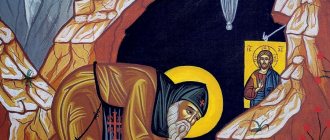About the Church Court
On July 19, by the Decree of His Eminence Isidore, Metropolitan of Smolensk and Roslavl, a new composition of the diocesan Church Court was approved. We talk about the activities of this body of the diocese with its chairman, Abbot Tarasius (Lange).
– Father Tarasy, at the beginning of our conversation, please explain what is within the competence of the diocesan court?
– Article 2 of the Regulations on the Church Court states that “Church courts are intended to restore the broken order and structure of church life and are designed to promote compliance with the sacred canons and other institutions of the Orthodox Church.” So, the church court deals with violations of church institutions and its main goal is to restore the violated order.
– How is the composition of the diocesan court selected? Who can become a member? Is it necessary for a monastic priest to become the chairman?
– According to the Regulations on the Church Court, “Diocesan courts are created by decision of the diocesan bishop (Chapter VII of the Statute of the Russian Orthodox Church). The diocesan court consists of at least five people holding episcopal or priestly rank. The chairman, deputy chairman and secretary of the diocesan court are appointed by the diocesan bishop. The remaining judges of the diocesan court are elected by the Diocesan Assembly on the proposal of the diocesan bishop” (Article 23, paragraph 1; Article 25, paragraphs 1,2). Of course, it is desirable that the members of the court, including the chairman, have a higher theological education and are canonists, but this is not a direct, indispensable condition. The chairman can be either a monastic or a married priest, it does not matter. What is important is pastoral experience, devotion to the Church and adherence to its canonical order, the absence of canonical punishments, and authority among fellow priests.
– Tell us about the new members of the court approved by the Decree of the ruling bishop...
– The change in the composition of the diocesan court occurred with the aim of updating its activities, in order to make the work of the court regular and thorough. According to the Regulations on the Church Court, the chairman, deputy chairman and secretary of the court are appointed by decree of the ruling bishop. According to Decree No. 042 of July 19, 2016, Abbot Tarasy (Lange) was appointed chairman of the court, Archpriest Andrei Melnichuk was appointed deputy chairman, and Priest Andrei Popov was appointed secretary of the court. Archpriest Nikolai Morozov was elected a member of the court by the diocesan meeting, and his powers remain unchanged, and the dean of the churches of the city of Smolensk, Archpriest Pavel Petrovsky, also became a member of the court.
The Regulations on the Church Court clearly define the responsibilities of all members of the court: “The chairman of the church court sets the time for sessions of the church court and conducts these sessions; exercises other powers necessary for church legal proceedings. The deputy chairman of the church court, on behalf of the chairman of the church court, conducts sessions of the church court; carries out other instructions necessary for ecclesiastical legal proceedings from the chairman of the ecclesiastical court. The secretary of the ecclesiastical court receives, registers and submits to the relevant ecclesiastical court statements of ecclesiastical offenses and other documents addressed to the ecclesiastical court; keeps minutes of church court meetings; sends out summonses to the church court; is responsible for maintaining and storing the archives of the church court; exercises other powers provided for by these Regulations. Members of the church court participate in court hearings and other actions of the church court in the composition and manner provided for by these Regulations” (Article 7, paragraphs 1-4). The ruling bishop, Metropolitan Isidor of Smolensk and Roslavl, expressed hope that the work of the court in the new composition will be more effective.
– What issues are now predominantly considered in diocesan courts? Do the cases being considered also concern clergy or laity?
– As has already been said, the church court can consider cases transferred to it by the ruling bishop, both in relation to clergy and in relation to laity. Cases of violation of the canons of the Church are being considered in relation to clergy, which entails a ban on priestly service for a certain period of time or for life, and in some cases, expulsion from the priesthood.
Lay people fall under the ecclesiastical court either by being classified as church officials or by being monastics. Both of them, having dedicated their lives to serving the Church, voluntarily accept responsibilities and vows, the violation of which is unacceptable. The excommunication of the laity from the Church or even their excommunication from communion for long periods due to the courts is practically non-existent.
But there are a number of extremely difficult and sad cases regarding the laity. These are court decisions on the possibility of funeral services for suicides. The church court does not judge a person who has died without permission, but decides on the possibility of his funeral service and church commemoration. This also includes cases of divorce from a church marriage.
– Are divorce cases also within the competence of diocesan courts?
– This issue was widely discussed and, as a result, was left to the discretion of the ruling bishops. The Regulations on the Church Court of the Russian Orthodox Church (Article 24) lists the cases under the jurisdiction of the church court, and also states that it may also have “other cases that, at the discretion of the diocesan bishop, require investigation.” In some dioceses, divorce cases are considered by a disciplinary commission. In our diocese, divorce cases fall under the jurisdiction of the church court. The reason for this decision was the severity of the sin of divorce, the need to clarify the reasons for the divorce, the decision to impose penance, since persons through whose fault the marriage was dissolved are allowed to enter into a second marriage only subject to “repentance and fulfillment of the penance imposed in accordance with the canonical rules” (Social concept of the Russian Orthodox Church, X.3).
– Who can go to church court? Does it depend on his religion?
– The Regulations on the Church Court say: “Church courts of the Russian Orthodox Church, referred to in the further text of these Regulations as “church courts”, have jurisdiction over cases in relation to persons under the jurisdiction of the Russian Orthodox Church” (Article 1, paragraph 4). This means that church legal proceedings can only be carried out against Christians, members of the Russian Orthodox Church. In matters related to the confession of faith, the celebration of the Sacraments, the performance of pastoral duties, only Christians of the Orthodox confession who are not involved in church crimes and are not involved in schisms, who are not on trial or excommunication, can be witnesses and accusers. But with regard to crimes of a moral nature, committed by a person of the Orthodox confession, any person, regardless of religion, can be a witness and even an accuser. Thus, the Apostle Paul in his letter to Timothy writes that the cleric must “have a good testimony from outsiders [i.e. not Christians - note] so as not to fall into reproach and the snare of the devil” (1 Tim. 3:7).
– Are meetings of a church court, unlike a civil court, always closed? Is it possible for a representative of the Orthodox press to be present at the trial?
– The Regulations on the Church Court (Article 5, paragraph 2) say: “The consideration of cases in the Church Court is closed.” If you make a meeting of a church court open, there is a danger that both Orthodox and non-Orthodox people, as well as people who, for various reasons, are hostile to the Church, may come to it. Pointing out the inappropriateness of such a situation, the Apostle Paul writes: “brother goes to court against brother, and that too before unbelievers” (1 Cor. 6:6). For church courts, publicity is inappropriate, because the subject of investigation in such courts are purely ecclesiastical issues, which often do not fit into the ideas about the crime of non-church people. For example, it will be difficult for non-church people to understand the crime of a cleric who, contrary to the decree of the ruling bishop, refused to move from one place of service to another, or, on the contrary, who left his ministry without permission. Or understand the crime of a monk who took vows, but was subsequently disappointed in his choice and left the monastery.
– What is the reason for the absence of lawyers in church courts?
– The Church court does not seek the condemnation of a Christian, a member of the Church, but his healing. The Lord Himself, addressing the perplexed Jews, said: “Go, learn what it means: I want mercy, and not sacrifice? For I did not come to call the righteous, but sinners to repentance” (Matt. 9:13). Likewise, the church court, even depriving a cleric of the opportunity to serve, thereby calls him to repentance, protects the Church and the offender himself from greater sin. In this sense, the church court itself provides protection, prompting the sinner to repent rather than to defend his rights. Most often, the accusation is based on the voluntary admission of guilt by the violator of the canons. It is on trusting, frank relationships that are appropriate between Christians that the activities of the church court are based.
– Thank you, Father Tarasy, for your time! God's help to you in this difficult field!
Interviewed by Vladislav Blagovestov
From the “Regulations on the Church Court”
“The diocesan court considers:
- in relation to clergy - cases on charges of committing church offenses, provided for by the list approved by the Holy Synod and entailing canonical sanctions (punishments) in the form of dismissal from office, dismissal from the staff, temporary or lifelong ban in priestly service, defrocking, excommunication ;
- in relation to laity belonging to the category of church officials, as well as monastics - cases on charges of committing church offenses provided for by the list approved by the Holy Synod and entailing canonical sanctions (punishments) in the form of dismissal from office, temporary excommunication from church communion or excommunication from the Church;
- other cases that, at the discretion of the diocesan bishop, require investigation, including cases on the most significant disputes and disagreements between clergy, provided for in Article 2 of these Regulations.”
Pentarchy of the Ancients, or the Trial of the Russian Church
On January 12, 2022, Patriarch Theodore of Alexandria sent a letter to the head of Phanar with a request to convene a meeting of the primates of the 5 Churches, or the so-called pentarchy. The reason is the creation of the Exarchate of the Russian Orthodox Church in Africa. Later it became known that the pentarchy would take place before Holy Week in Phanar. The hierarchs of the Greek Churches are talking about the temporary abolition of autocephaly for the Russian Church, or even the deprivation of grace from the Russian Orthodox Church. What to expect from this meeting?
What is a pentarchy?
The Pentarchy, or “five powers,” is a theological concept developed in the Byzantine Empire. According to it, the most important decisions for world Orthodoxy should be made by the primates (patriarchs) of five Churches: Rome, Constantinople, Alexandria, Antioch and Jerusalem.
Later, due to the fall of the Roman bishop from Orthodoxy, the Patriarch of Moscow became the fifth patriarch of the pentarchy, receiving equal honor with the four ancient eastern patriarchs. However, the rights of the members of the pentarchy have not yet been clearly defined. None of the conciliar or patristic canons recognized by the entire Orthodox Church speaks of the existence of a body of church authority consisting of five patriarchs.
It is worth noting that in 2011, a phenomenon known as “neopentarchy” appeared, with a claim to special rights to ensure the governance of the Church and the resolution of issues facing it.
For the first time, the idea of “neo-pentarchy” was voiced by Patriarch Bartholomew, who announced the convening in September 2011 of the Council of Primates of the “ancient Churches” (the four Eastern Patriarchates and the Church of Cyprus). Notifying the four Eastern Patriarchs of the convening of the aforementioned September Council, the head of the Phanar literally stated the following: “The oldest Patriarchates of the Orthodox Church, together with the Holy Church of Cyprus ... are like the core of the entire building and composition of the Orthodox Church.”
It was these primates who, in the opinion of the head of the Phanar, were supposed to determine the position of the Church on a number of issues.
On September 1–3, 2011, the heads of the Churches, gathered under the wing of Patriarch Bartholomew, issued a statement in which it was clearly stated that they had gathered at Phanar “in order to revive the ancient custom” of the pentarchy.
Why does Phanar need a pentarchy?
It should be noted here that in the diptychs of the Orthodox Churches, the Archbishop of Cyprus usually occupies 10th place, that is, he is quite far from the claims to the circle of the elect.
But due to “special” connections with the eastern patriarchs (primarily we are talking about common Greek roots and adherence to the idea of Hellenism), the head of the Church of Cyprus was placed by the Phanariots on a par with the primates of Constantinople, Alexandria, Antioch and Jerusalem. In July 2016, Phanar representative Archbishop Job (Gecha) of Telmis noted that the members of the pentarchy “are the Churches that were approved at the Ecumenical Councils,” and the other Churches are “a new wave of autocephalies that were not confirmed by the Ecumenical Council.”
It is interesting that all the attempts of the Phanariots to launch the idea of “neo-pentarchy” (without the Moscow Patriarch, but with the Archbishop of Cyprus), as it turned out, were necessary only in order to later justify the legalization of Ukrainian schismatics and the “autocephaly” of the OCU.
The same Job (Gecha), discussing the special status of the eastern patriarchs and the Church of Cyprus, noted that the territory of Ukraine is under the jurisdiction of the Phanar, and “the Mother Church of Constantinople can grant autocephaly to the Ukrainian Church.”
As a result, the OCU received a Tomos, the Primates of Greece, Alexandria and Cyprus recognized it, the Russian Church in response to this created the Exarchate in Africa, and Patriarch Theodore demanded the convening of a pentarchy.
It is clear that in this situation any “meeting” of the Greeks will have only one goal - to condemn the Russian Church. For example, some representatives of the Greek and Alexandrian Churches stated that the Russian Church, as a result of a meeting of five primates of the “ancient apostolic Churches,” could lose its independence for a period of five years. Moreover, she may be deprived of the grace of the sacraments. The threats look impressive, but what is behind them?
Who will or will not go to Phanar?
On February 12, 2022, the representative of the Phanar, Metropolitan Emmanuel of Chalcedon, invited Patriarch John of Antioch to the Council... of four primates. That is, instead of a pentarchy, a “tetrarchy” may await us, since one of the possible participants in this Council has already refused to come to the Phanar. It is assumed that we are talking about the Primate of the Cypriot Orthodox Church, Archbishop Chrysostomos.
In general, Chrysostom’s reluctance to participate in the trial of the Russian Orthodox Church is understandable. Due to the recognition of the OCU, the Cypriot Church actually split, and Archbishop Chrysostomos received powerful opposition among the Cypriot hierarchs who disagreed with the legalization of Ukrainian schismatics. In such conditions, Archbishop Chrysostomos himself understands that the Synod of the Cyprus Church is unlikely to approve his trip to the Phanariot Council. If, contrary to the opinion of the synodals, he nevertheless decides to participate in it, then this will definitely have the most serious consequences both for him personally and for the Church of Cyprus as a whole.
The participation of the Patriarch of Antioch in the council is also in question. Immediately after the visit of Metropolitan Emmanuel of Chalcedon to him, reports appeared in the media that Patriarch John accepted the invitation of the head of Phanar and would come to the Council. However, this is not the case.
On February 14, a delegation from the Patriarchate of Alexandria arrived at the Antioch Church. The purpose of this visit is clear without further ado - to convince Patriarch John of the need to participate in the Phanariot Council. The Primate of the Antiochian Church replied that his trip to Phanar was possible only if the Synod approved it. This means that, at least for now, he has gently declined Phanar's invitation. What does this assumption allow us to make?
Let us remember that the Patriarchate of Antioch, like the Russian Church, did not participate in the 2016 Cretan Council, the holding of which was the life’s work of Patriarch Bartholomew. This means that the Primate of Antioch was not afraid to seriously spoil relations with Phanar. Just as he was not afraid of the “wrath of the Phanariots” in the “Ukrainian question”, openly supporting the Russian Church. Therefore, even if Patriarch John agrees to participate in the “Council of Four,” his voice is unlikely to replenish Bartholomew’s piggy bank. Quite the contrary.
In addition, it is unlikely that Patriarch Theophilos of Jerusalem will also come to the Council. There are also more than enough reasons for this.
Firstly, he, although in cautious words and expressions, repeatedly made it clear that he opposed the legalization of the Ukrainian split.
Secondly, it was Patriarch Theophilus who initiated the Amman Conference of Primates of Local Churches, and recently announced the need to hold Amman-2.
Thirdly, the Patriarchate of Jerusalem at the moment (as always) needs the help of the Russian Church, since its existence in the Holy Land is under threat today.
Therefore, it is unlikely that Patriarch Theophilus will put the absurd “autocephaly” of the OCU on one side of the scale, and his own principles on the other. But if the “Council of Four” does take place, then what should the Russian Orthodox Church expect from it?
“The Council of Four”: what should the Russian Church expect?
The Greek media are confident that the general position of the Phanar on the issue of creating the Exarchate of the Russian Orthodox Church in Africa will depend on the attitude of the Antioch and Jerusalem Patriarchates. However, to this day there has been no such reaction. Its absence is explained simply: both Antioch and Jerusalem most likely believe that the root cause of the crisis is not the Russian Orthodox Church, but the “autocephaly” of the OCU. This means that if they come to Phanar, it will be only to decide what to do next.
It is unlikely that we will witness the “deprivation of autocephaly” of the Russian Orthodox Church, as the Alexandrians demand. Both because such an action has no historical precedents and is canonically unfounded, and because it is not clear which document on autocephaly of the Russian Orthodox Church the “Council of Four” will declare invalid.
The fact is that regarding the independence of the Russian Church there are at least three acts signed by the Patriarchate of Constantinople. This:
- Proclamation in Moscow in 1589 by the then Patriarch of Constantinople Jeremiah II of Archbishop Job of Moscow as Patriarch, his consecration as Patriarch.
- The Synodal Charter of 1590, or Tomos on the elevation of the Metropolitan of Moscow to the Patriarch of the East, which ratified the agreements concluded in Moscow in 1589, with the addition of recognizing the right of the Synod of the Russian Church to elect the Patriarch of Moscow.
- Patriarchal and Synodal Tomos of 1593, which ratified previous acts.
So which of these documents is subject to cancellation? It is unlikely that Phanar will be able to answer this question. And what could the “cancellation” of autocephaly of the Russian Orthodox Church lead to? Will Phanar declare his power over her? Looks like a low-budget fantasy script with a church theme. Therefore, the most likely result of all this talk about a possible “Cathedral of Four,” it seems to us, will be its absence “due to the non-appearance of participants.” Most likely, neither the Antioch nor the Jerusalem Patriarchs will come to it, which means this idea will sink into oblivion.
Of course, it is possible that the Phanariots will try, according to the words of Metropolitan Seraphim of Piraeus, to persist further and go against the canons and logic. But where can this lead the Church? Only to the final split of Orthodoxy. Will they decide to do this, taking into account the fact that only three Churches supported them on the issue of the OCU? Hardly.
And can the word of people who have already been called schismatics in the Russian Church itself have any weight?
